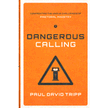Counselors Reflect on Dangerous Calling by Paul Tripp
A Series to Care for the Care Takers of God’s People
“Maturity is not merely something you do with your mind (although that is an important element of spiritual maturity). It is about how you live your life. It is possible to be theologically astute and be very immature. It is possible to be biblically literate and be in need of significant spiritual growth.” (Paul David Tripp, page 25)
How long have you been a believer? Five years, ten years, 20 or more years? In the time you have been a believer, perhaps you, like me, have heard stories of the Bible, learned the books of the Bible, and have come to know many “facts” about Scripture. If you have been to seminary, you have learned “hermeneutical principles” of the Bible and the importance of understanding the cultural context and audience. Does knowing all the facts about Scripture make one spiritually mature? No. If we have heard things again and again, there is a tendency to think, “We know this already…” In the context of relationship, though, do you ever really know someone completely?
There are two types of knowing something. The first type is intellectual. We can know facts, information, and statistics. We can know the capital of the United States, the answer to 2+2, or how many books there are in the Bible. The second type of knowing, however, involves relationship. This type of knowing can only be known through time and fellowship. We may say that we know another person (though just an acquaintance), but we cannot ever really know a person until time and effort is spent getting to understand him or her. The Lord is no different. It is not enough just to know about Him. We must fellowship with Him.
To illustrate further, let’s use an example from Spanish. Two types of the word “to know” exist. Saber involves facts, details, and information. We can know (saber) the writer of the Gospel of John. Conocer is the second type of knowing and involves relationship. (Though it is not my purpose to give a Spanish grammar lesson, Spanish does make a distinction in the verb know that is important.) The danger of knowing facts about Scripture (saber) without knowing the Author (conocer) is a dangerous thing. Paul David Tripp notes, “Sin is not first an intellectual problem [though it does affect intellect]. Sin is first a moral problem. It is about my rebellion against God and my quest to have for myself the glory that is due to him. Sin is not first about the breaking of an abstract set of rules. Sin is first and foremost about breaking relationship with God” (p. 26). Though it is tempting to think we may know everything already, the fact remains, we do not. Our hearts deceive us (Jer. 17:9), again and again. Tripp rightly notes, “Biblical maturity is never about what you know; it’s always about how grace has employed what you have come to know to transform the way you live” (26, italics mine). Because our hearts deceive us, we need the Lord’s help. He is the only One who can understand the heart. If tempted to think, “I know this already” (saber), perhaps we should stop, take a step back, and ask, “Is what I know transforming the way I live?” Though the Pharisees knew the law inside and out and all the religious regulations, Christ called them “whitewashed tombs” (Matt. 23:27) because their hearts (the core of who they were) were far from Him. Grace is a gift from God. So is growing in fellowship with Him. Spiritual growth involves knowing a person (conocer), not details about Him. With the Lord’s help, we can come to know (conocer) Him in a way that transforms our lives.
 |
Dangerous Calling: Confronting the Unique Challenges of Pastoral Ministry By Paul David Tripp / Crossway Books & Bibles |
